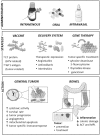Probiotic Bacteria: A Promising Tool in Cancer Prevention and Therapy
- PMID: 30949803
- PMCID: PMC6586914
- DOI: 10.1007/s00284-019-01679-8
Probiotic Bacteria: A Promising Tool in Cancer Prevention and Therapy
Abstract
Gut microbiota is widely considered to be one of the most important components to maintain balanced homeostasis. Looking forward, probiotic bacteria have been shown to play a significant role in immunomodulation and display antitumour properties. Bacterial strains could be responsible for detection and degradation of potential carcinogens and production of short-chain fatty acids, which affect cell death and proliferation and are known as signaling molecules in the immune system. Lactic acid bacteria present in the gut has been shown to have a role in regression of carcinogenesis due to their influence on immunomodulation, which can stand as a proof of interaction between bacterial metabolites and immune and epithelial cells. Probiotic bacteria have the ability to both increase and decrease the production of anti-inflammatory cytokines which play an important role in prevention of carcinogenesis. They are also capable of activating phagocytes in order to eliminate early-stage cancer cells. Application of heat-killed probiotic bacteria coupled with radiation had a positive influence on enhancing immunological recognition of cancer cells. In the absence of active microbiota, murine immunity to carcinogens has been decreased. There are numerous cohort studies showing the correlation between ingestion of dairy products and the risk of colon and colorectal cancer. An idea of using probiotic bacteria as vectors to administer drugs has emerged lately as several papers presenting successful results have been revealed. Within the next few years, probiotic bacteria as well as gut microbiota are likely to become an important component in cancer prevention and treatment.
Conflict of interest statement
The authors declare that they have no conflict of interest.
Figures

References
-
- Goldin BR, Gorbach SL. Effect of Lactobacillus acidophilus dietary supplements on 1,2-dimethylhydrazine dihydrochloride-induced intestinal cancer in rats. J Natl Cancer Inst. 1980;64:263–265. - PubMed
-
- Kim Y, Lee D, Kim D, et al. Inhibition of proliferation in colon cancer cell lines and harmful enzyme activity of colon bacteria by Bifidobacterium adolescentis SPM0212. Arch Pharm Res. 2008;31:468–473. - PubMed
-
- Thirabunyanon M, Boonprasom P, Niamsup P. Probiotic potential of lactic acid bacteria isolated from fermented dairy milks on antiproliferation of colon cancer cells. Biotechnol Lett. 2009;31:571–576. - PubMed
-
- Altonsy MO, Andrews SC, Tuohy KM. Differential induction of apoptosis in human colonic carcinoma cells (Caco-2) by Atopobium, and commensal, probiotic and enteropathogenic bacteria: mediation by the mitochondrial pathway. Int J Food Microbiol. 2010;137:190–203. - PubMed
Publication types
MeSH terms
Substances
Grants and funding
LinkOut - more resources
Full Text Sources
Other Literature Sources
Medical

